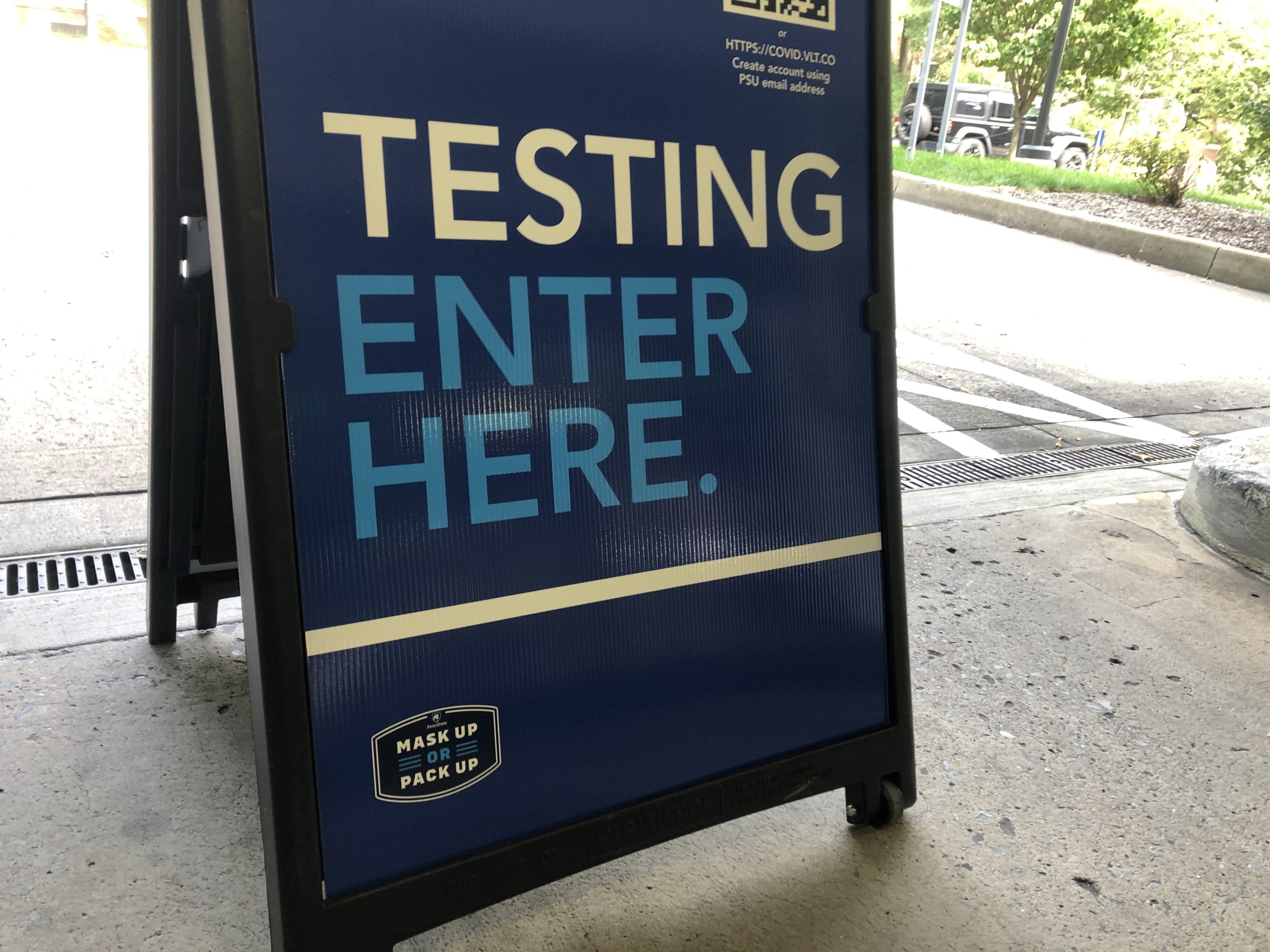
Photo by Geoff Rushton | StateCollege.com

Photo by Geoff Rushton | StateCollege.com
Penn State will ramp up its COVID-19 testing requirements for the spring semester, requiring students to be tested before the start of in-person classes next month and again within the first two weeks of returning to campus, as well as conducting surveillance testing throughout the semester.
The university began classes with fully remote instruction on Tuesday, with plans to start in-person classes on Feb. 15. During the remote period, students living in the surrounding community, and the few living on campus, are required to be tested as well.
“The spring semester testing strategy is built on the testing plan we implemented in the fall, but we have expanded it based on what we learned in the fall semester and changes we made as we responded to the pandemic,” Penn State President Eric Barron said in a statement. “While the pandemic remains complex and ever-changing, our augmented and extensive approach to testing will help us to mitigate spread and keep our campuses and local communities as safe as possible. Still, it will take our entire community – students, faculty and staff – working together and taking proper health precautions to be successful in our efforts to maintain in-person activities.”
Plans for the spring mark a beefed up effort from the fall, when the university did not require all students to be tested prior to arrival, nor did it mandate they be tested within the first two weeks. Instead, about 23,000 individuals from high-prevalence areas were required to complete a pre-arrival test, while daily asymptomatic surveillance testing of about 2% of the campus population also was conducted.
Surveillance testing will continue throughout the spring semester, as will symptomatic testing and testing for individuals identified through contact tracing or who believe they were exposed to someone with COVID-19.
Pre-arrival Testing
All students have a negative test result from a university-provided test on file within 72 hours before returning to campus or the surrounding community. That includes those who will have a fully online course load and live in Centre County or within a 20-mile radius of a Penn State campus.
Students who tested positive for COVID-19 within the previous 90 days are exempt from the requirement.
Self-test kits are being provided at no cost and negative test results from a third-party provider will not be accepted.
To start the initial testing process, check their status or to upload a positive PCR test from a third party from the past 90 days for approval, students must log in to the “Know Your Status” Portal.
First Two Weeks
During the first two weeks of in-person classes, all students taking classes on campus or who are taking a fully remote course schedule and living in Centre County or within 20 miles of a Penn State campus will be required to get a COVID-19 test.
Students will receive an email to register for a time. At University Park, the universal testing will take place seven days a week in room 126 of the White Building.
Those who tested positive will be directed to isolation and contact-tracing will begin.
Semester-Long Testing
Penn State will again conduct daily random surveillance testing of about 2% of those who live, work or learn on campus. Employee surveillance testing will begin on Feb. 15. Since all students are required to be tested within the first two weeks of in-person learning, student surveillance testing will begin on March 1.
From Feb. 15-28, surveillance testing will be done at the Mount Nittany Club in Beaver Stadium. Beginning March 1, it will be conducted at the Mount Nittany Club and 101 N. Atherton St.
“Our surveillance testing program is key to gauging the prevalence of the virus on our campus and to minimizing spread,” Kelly Wolgast, director of Penn State’s COVID-19 Operations Control Center, said in a statement. “We all need to do our part to help, and that includes participating in the random surveillance testing when you are selected to do so. This data is vital in our efforts to maintain on-campus activities as safely as we can.
Testing for students with COVID-19 symptoms will be available by appointment through University Health Services.
Walk-up testing for University Park students identified through contact tracing or who believe they were exposed to someone with COVID-19 will be available at the Hintz Alumni Center and Pegula Ice Arena. The site will also be available for University Park employees listed in Penn State’s Return to Work database, though they are encouraged to order a mail-in test kit from university provider Vault Health.
Reporting
Penn State’s revamped COVID-19 dashboard will be updated every Monday, Wednesday and Friday throughout the spring semester. In the fall it was updated every Tuesday and Thursday.
Since the semester ended on Dec. 19 through Sunday, testing at University Park yielded 124 COVID-19 positives. Those included 76 from 2,779 student tests and 48 from 1,299 employee tests.
Campus testing has found 5,249 COVID-19 positives — 5,128 among students and 121 among employees — out of nearly 100,000 on-demand and surveillance tests administered since the beginning of the fall semester in August.
Receive all the latest news and events right to your inbox.

80% of consumers turn to directories with reviews to find a local business.